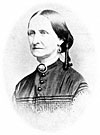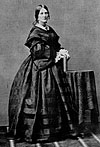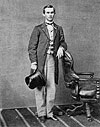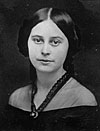There were seven bedrooms on the second floor of the White House where the office of the President was also located. Mr. and Mrs. Lincoln each occupied one. Lincoln’s secretaries, John Nicolay and John Hay, occupied another one. After Willie died, only Tad needed a bedroom on a regular basis and he often slept with his father. Robert occupied one of three guest bedrooms when he was home from college. So, there was always room for relatives and old friends, whom Mr. and Mrs. Lincoln often encouraged to stay with them.
This was particularly important when Mrs. Lincoln was sick or in grief. Mary’s cousin Elizabeth Grimsley, sister Elizabeth Edwards and half-sister Emilie Helm played this role for the longest periods. But Mary could be trying and Mary’s relatives could be demanding of jobs and favors. Often the best company for her was provided by non-family members like seamstress Elizabeth Keckley and nurse Rebecca Pomroy.
Some relatives were not welcome — virtually all of Mrs. Lincoln’s secessionist family, but especially Martha Todd White.The Richmond Enquirer published a new item in early March 1864 saying that Martha Todd White had “gone through the lines to Lexington, Kentucky, and being a sister (Todd) of Mrs. Lincoln, was permitted to on to Washington.” Returning south, she supposedly brought with her a uniform with buttons made of pure gold, worth at least $30,000.” Historian Stephen Berry wrote: “The story of Martha Todd White and the gold buttons took off like herd of horses – though not because it was true. Southern papers reprinted the story because it reinforced the idea that th Confederacy could not be defeated because Southern women wouldn’t allow it. Northern papers reprinted the story for an entirely different, but equally simple, reason: it was an election year – Lincoln was vulnerable, and the story was embarrassing.”1
In Washington, Martha had “made herself conspicuous by talking ‘secesh’ and waving her pass about in a Washington hotel. She enlisted the aid fo two Kentucky representatives (Robert Mallory and Brutus Clay), who took her requests in to the president personally. Undoubtedly suffering an acute case of Todd-fatigue, Lincoln finally snapped. When Clay stepped into his office to bend his ear on the same tired subject, he told the congressman that ‘if Mrs. W. Did not leave forthwith, she might expect to find herself within twenty-four hours in the Old Capitol Prison.”2 Newspapers such as the New York World delighted in embarrassing President Lincoln with exaggerated stories of Martha’s exploits: “…the contents of his wife’s sister’s trunks are giving aid and comfort to the enemy – not least is the shock which these facts will give tothe loyal hearts whose hopes and prayers and labors sustain the cause which is thus betrayed in the very White House.”3
The living situation at the White House was somewhat strained in another respect. Nicolay and Hay did not get along with Mrs. Lincoln. So, although they worked and slept at the White House, they did not eat their meals there. But because they were so close to the President, Nicolay and Hay were available to accompany the President to the theater if Mrs. Lincoln was out of town. The two young men had been friends in Illinois before Hay left for college at Brown University. They shared literary ambitions and political admiration for the President. Although several men served as secretaries to President Lincoln, only Nicolay officially held the title. Hay himself officially was a clerk at the Pension Office until he joined the War Department payroll as an assistant adjutant general in 1864.
Both men chafed at the boorishness of those who wrote and waited on the President. On May 6, 1861, Hay wrote a Kentucky State Senator on behalf of the President concerning the politician’s protest of an army occupation of Cairo, Illinois. Hay assured the man that the President “never [would] have ordered the movement of troops complained of, had he known that Cairo was in your Senatorial district.” In his diary, Hay wrote: “it will take the quiet satire of the note about a half an hour to get through the thick skull of this Kentucky Senator, and then he will think it a damned poor joke.”4
The two secretaries were also available for late night discussions of public policy or the latest in political humor with Mr. Lincoln. On May 14, 1864, Hay recorded in his diary: “The President came in last night in his shirt & told us of the retirement of the enemy from his works at Spottsylvania & our pursuit. I complimented him on the amount of underpinning he still has left & he said he weighed 180 pds. Important if true.”5 The two secretaries remained friends and eventually turned their intimate knowledge of the Lincoln presidency into a ten-volume biography of their boss.
The secretaries did get along with the President’s eldest son when he was home on vacation from Harvard. According to Hay friend William E. Doster, who was Provost Marshal for Washington, Robert was “Much in the secretaries’ company during vacations. He affected the English style, but was esteemed a very clever fellow, and joined us at the Metropolitan Club, our headquarters. The rest of us met at Philps’s, a stationer, of the firm of Philp & Solomon, who received his gentlemen friends every Sunday evening, and where affairs of State were discussed. The two secretaries were much courted for their supposed influence, but I do not remember any one who could boast of having obtained any favor through them. Their Chief made up his own mind.”6
Footnotes
- Stephen Berry, House of Abraham: Lincoln & The Todds, A Family Divided by War, p. 157
- Berry, House of Abraham: Lincoln & The Todds, A Family Divided by War, p. 162
- Berry, House of Abraham: Lincoln & The Todds, A Family Divided by War, p. 159.
- Michael Burlingame and John R. Turner Ettlinger, editors, Inside Lincoln’s White House: The complete Civil War Diary of John Hay, p. 19.
- Michael Burlingame, editor, Inside Lincoln’s White House, p. 196.
- William E. Doster, Lincoln and Episodes of the Civil War, pp. 31-32.
Visit

 Elizabeth Todd Edwards
Elizabeth Todd Edwards Elizabeth Todd Grimsley
Elizabeth Todd Grimsley John Hay
John Hay John Nicolay
John Nicolay Emilie (Emily) Todd Helm
Emilie (Emily) Todd Helm





